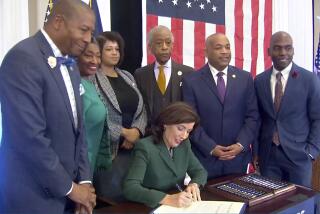South Africa’s Path to Healing
Eventually, time and reallocation of resources can heal divided nations. South Africa took a shorter path: confession and honesty.
How do former enemies overcome a legacy of assassinations, massacres, bombings, torture and bloodletting? How do victims make peace with killers? In the new South Africa, the Truth and Reconciliation Commission encouraged full disclosure, holding all, white and black, accountable for violence and offering the balm of amnesty in exchange.
Credit for this undertaking goes to President Nelson Mandela, whose unassailable moral stature set the tone. When released from an unjust imprisonment, he chose to lead without rancor, obsessed not with the injustices of the past but with the possibilities of the future. In other deadly internal conflicts around the world, from Rwanda to Kosovo, that elevated moral leadership is lacking.
Mandela chose retired Archbishop Desmond Tutu to chair the commission, but the president did not receive the newly released final report with enthusiasm, for it criticized his African National Congress itself for killing innocents, just as it criticized the former white minority government for its slaughter of noncombatants during the long decades of apartheid. But the evenhandedness of the Reconciliation Commission was meant to reassure all sides that there could be a future without retribution, and so far it has largely worked.
The commission focused on events since 1960, when the ANC was banned by the white minority government, through 1993 when Mandela was freed from prison. During that bloody era, white presidents approved death squads, mass murders and executions in the name of racial supremacy.
The commission held accountable a former and unapologetic president, Pieter W. Botha, who refused to testify, for the government’s violent campaign to preserve apartheid and white privilege. It also held accountable former President Frederik W. De Klerk, who testified but blocked the release of any findings about his role.
The widow of black activist Steven Biko, beaten to death by police in 1977, has challenged the commission’s right to forgive the murderers of her husband. Was it right for the commission to trade amnesty for truth?
Should Winnie Madikizela-Mandela, the former wife of Nelson Mandela, be forgiven for her role in the murder of teenage activist Stompie Seipi by members of her infamous Mandela United Football Club?
Does amnesty negate justice for the killers of Amy Biehl, the Rhodes scholar from Newport Beach who was murdered while working on voting rights for blacks? All difficult questions.
There’s still hard work to come: Rulings on thousands of applications for amnesty remain to be made. But with the commission’s report, the nation moves ahead.
More to Read
Sign up for Essential California
The most important California stories and recommendations in your inbox every morning.
You may occasionally receive promotional content from the Los Angeles Times.










